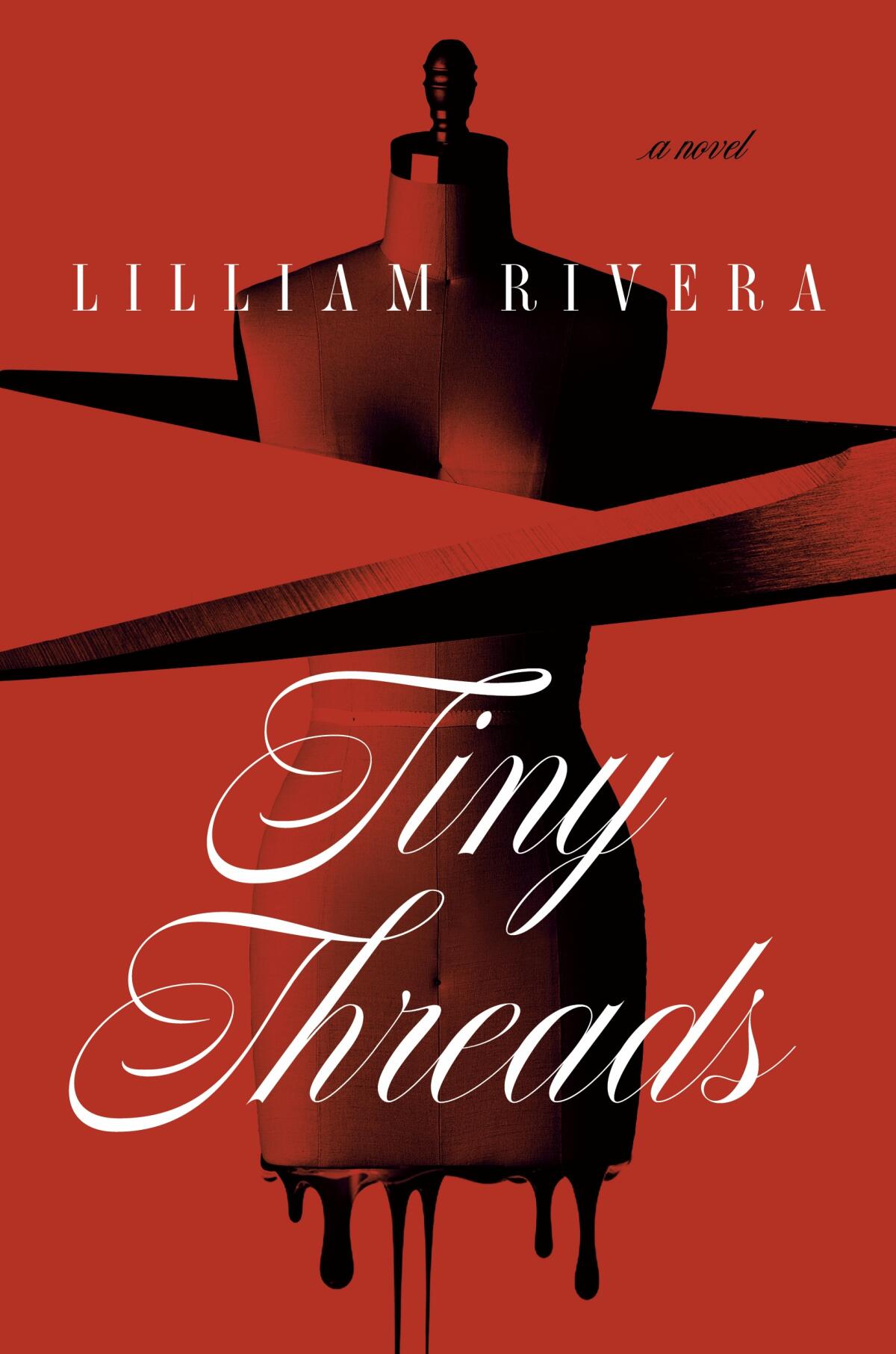A tale of fashion, misogyny and the brutality of capitalism

- Share via
Book Review
Tiny Threads
By Lilliam Rivera
Del Rey Books: 256 pages, $26
If you buy books linked on our site, The Times may earn a commission from Bookshop.org, whose fees support independent bookstores.
When I was shopping for a Mini Cooper last year, I headed to Mini of Downtown Los Angeles, figuring it would be 15 or 20 minutes from my Silver Lake home. Forty-five minutes later, I passed a sign that read, “City of Vernon, California. Exclusively industrial. Founded 1905.” Five minutes after that, I arrived at the dealership and asked why its name included DTLA, when it was clearly in Vernon. “Because nobody’s ever heard of Vernon,” the salesman told me.
More people will soon have heard of Vernon, thanks to the wildly imaginative new novel from Lilliam Rivera, former entertainment editor at Latina Magazine and the author of seven children’s and YA books. In her first adult novel, “Tiny Threads,” the city of Vernon is as much a player as its human — and ghostly — characters. Not the Vernon of misleadingly named car dealerships, mind you, but the Vernon that literally stinks of capitalism’s crimes. In the book’s acknowledgments, Rivera summarizes the novel’s twin themes: the brutality of for-profit mass production — specifically of meat and fashion — and the brutality of misogyny.
“Although the Vernon I write about in this book is purely fictional,” Rivera writes, “factories have been poisoning brown communities for decades, while powerful men believe that their sexual predations are a right.”

In real life, the Farmer John slaughterhouse — covered with murals depicting pink pigs frolicking on bright green farmland — stank up Vernon’s air for nearly a century, until it closed in 2023 citing high operating costs in California. In Rivera’s Vernon, Farmer John’s stand-in is Consuelo’s Farmhouse and its neighbor is the fictional House of Mota, headquarters of once legendary, now failing fashion designer Antonio Mota. Drawn by the industrial town’s cheap rents and certain that Vernon is on the brink of gentrification, the famously rageful Mota is desperate to rescue his company from obsolescence. He plans a show of new designs and lures young, ambitious fashion journalist Samara from the East Coast to promote it.
Thrilled to move to “Downtown Los Angeles,” Samara shows up at work on her first day congratulating herself on the wisdom of her big move, until she gets a whiff of the putrid “Vernon perfume” rising from the slaughterhouse smokestacks next door — and is roundly snubbed by her co-workers. Her California dream quickly fading, Samara realizes that she’ll have mere weeks to conceive of and execute a fashion show concept, secure a location and cast the models and crew.
Samara’s discomfort follows her home. Night after night, she is jerked awake at 2 a.m. by strange, terrifying apparitions and visions that threaten her sanity, and eventually, her life. Samara initially tries to hide this information from her unsupportive mother, who had opposed Samara’s move to Vernon: “It’s not that she doesn’t want to worry her mother, it’s just she doesn’t want her to win.” But driven to desperation by the nightly horror show running on loop in her head, Samara finally confesses how disturbed she is: “It sounds like someone crying or whimpering.… Sometimes it sounds like rustling, like something trying to break free from a trap.”
“Those are rats,” her mother says. “Are you cleaning the kitchen?”
In her latest short story collection, Argentine writer Mariana Enríquez offers haunting imagery and a sharp focus on mental, physical and economic ruin.
As the ghosts’ voices, the office politics targeting Samara and the deadline for the collection’s completion all close in, Samara becomes painfully aware of Vernon’s gentrification and her own part in it. On her way home from work one afternoon, she stops by a small local gallery and chirps at Marisa, the artist/owner, “It must be exciting to see this new development happening at Vernon.”
“It’s good for some people,” Marisa retorts, wrapping the painting Samara has bought. “Rich people trampling over those who are actually from here and polluting our land.”
As Samara loses all sense of equilibrium, a relaxing glass of wine before bed becomes a bottle, then two; a vodka shot added to her morning coffee becomes a steady daylong stream of liquid courage. With the fashion show looming, pills and cocaine become ubiquitous in the House of Mota, supplementing Samara’s day-and-night drinking. Samara’s disintegration is a case study in the kinds of circumstances that can trigger addiction: a demanding, irrational boss; unfriendly co-workers; nightly torture by ghosts that might or might not be carrying messages from Vernon’s past and Samara’s; and corrosive secrets that destroy the places and people who hold them.
“Tiny Threads” lives up to its genre. It is a horror novel, its supernatural and real elements interwoven so seamlessly that the reader begins to question reality, as Samara does in a scene near the story’s end, watching a model walk the runway in the fashion show Samara has worked so hard to put on. “The model has beautiful indigenous features that contrast against her straight, white-blonde hair. Her mouth is parted and the rigid edges of her teeth shimmer. … Samara stares in horror at the pinkness of the model’s moist tongue, licking her mouth before biting a piece of her bottom lip clean off.”
“Tiny Threads” is also a social critique, dissecting the fashion and meatpacking industries, racism, the glitter and grief of gentrification, the nightmare of the abusive workplace and the unending repercussions of child sexual abuse. As in real life, these issues remain unresolved in the novel. Rivera’s talent is formidable enough to make the book’s big questions as engrossing as its horrors.
Meredith Maran, author of “The New Old Me” and other books, lives in Silver Lake.
More to Read
A cure for the common opinion
Get thought-provoking perspectives with our weekly newsletter.
You may occasionally receive promotional content from the Los Angeles Times.










